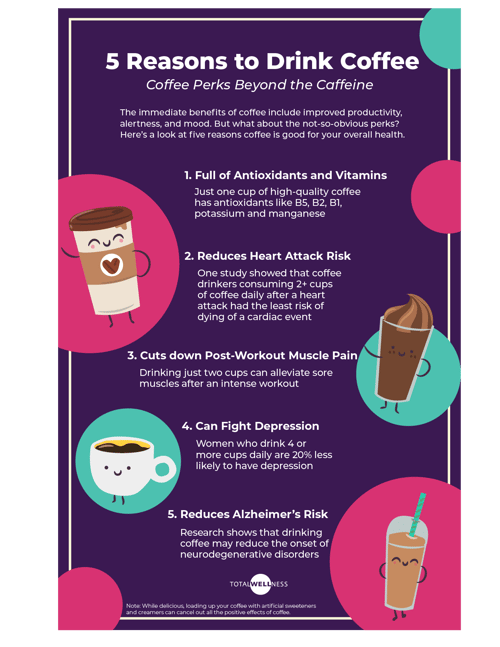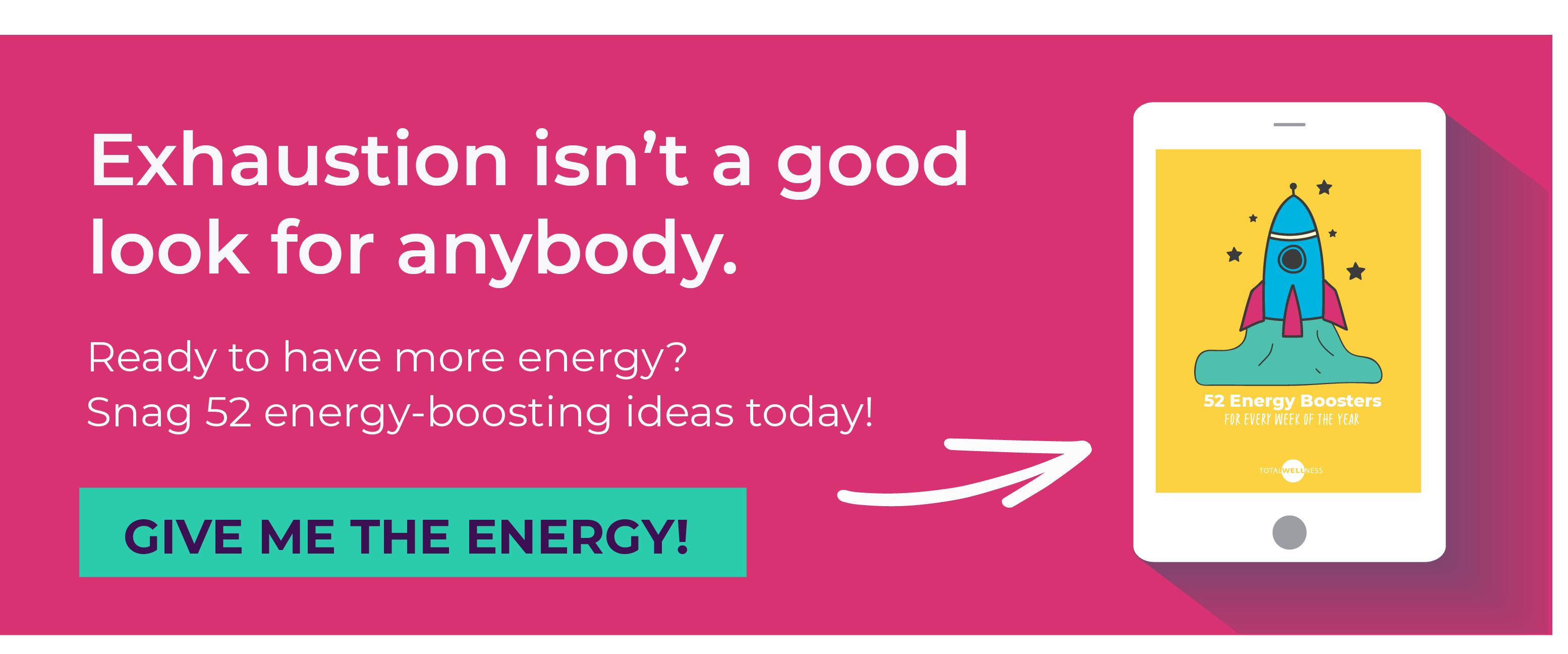If you can’t start your day without coffee, you’re not alone.
Last year, the National Coffee Association surveyed 3,000 Americans on their java drinking habits. The survey found that 64 percent of Americans drink at least one cup of coffee daily.
The amount of Americans downing this beverage is the highest it’s been in years. Thanks to its ability to wake us up quickly, it’s become the go-to beverage for working Americans for decades.
As a stimulant, coffee is known to:
- Improve memory
- Increase energy levels
- Shorten reaction times
- Boost productivity
As one of the best instant energizers, coffee is well-known for its stimulant effects, but it also has several surprising health benefits, too, like reducing pain.
Need another reason to keep up your daily coffee habit?
Read on to learn about all the positive benefits hiding in your favorite brew.
The Positive Effects of Coffee
Due to its antioxidants and nutrients, coffee does more than stimulate the brain. In fact, it improves mental function and can aid the body in fighting off chronic health issues.
It’s also a powerhouse beverage for staving off other health concerns that impact body functions of the brain, liver, and heart. Backed by science, here’s why it’s definitely okay to have that cup of coffee every morning:
Works as a Pain Reducer
Love to workout but hate the muscle soreness that follows? A published Journal of Pain study by the University of Georgia found that downing about two cups of brewed coffee could minimize exercise-induced muscle pain.
Reduces Depression and Suicide Risk
A 10-year study found women who drink coffee are less likely to commit suicide and are less depressed. The study was conducted on 86,000 female nurses. Another study by Harvard School of Public Health discovered women who drink four or more cups of java a day were 20% less likely to have depression.
Improves Liver Health
Worried about the health of your liver? Aside from cutting out alcohol use, upping your coffee intake may protect against cirrhosis of the liver. Ingesting both caffeinated and/or decaf coffee lowers enzymes of the liver, according to a Hepatology Journal published study.
Staves Off Parkinson's & Alzheimer's
Downing dark-roasted coffee (caffeinated or decaf) can be quite good for brain health. Since this type of coffee has compounds called phenylindanes, it may protect the human brain from developing Parkinson’s and Alzheimer's. In some studies, coffee lovers had up to a 60% lower risk of developing such neurodegenerative disorders.
Decreases Chance of Type 2 Diabetes
This chronic disease which impacts millions of people worldwide is often largely preventable by making healthier lifestyle choices. Aside from eating healthier and exercising more, studies have shown that each daily cup of coffee can translate to a 7% decrease in type 2 diabetes.
May Reduce Cardiovascular Disease
Studies have shown that coffee doesn’t raise the risk for heart disease and actually reduces the chance for strokes. Researchers have also discovered that people who were drinking 2+ cups of coffee daily after a heart attack had the least risk of dying from one.
Protects Against Cancer
With each cup of java, coffee drinkers may be building protection against liver and colorectal cancers, the third and fourth leading causes of cancer death worldwide. A University of Southern California (USC) study found that the more coffee consumed, the lower the risk of colorectal cancer development.
Decreases Multiple Sclerosis Risk
A study published in the Journal of Neurology, Neurosurgery & Psychiatry found that high consumption of coffee has been linked to a decreased multiple sclerosis risk, possibly due to its neuroprotective properties like reducing neural inflammation. The study showed that drinking at least four cups a day could be helpful.
Full of Antioxidants and Vitamins
Coffee is high in antioxidants and contains vitamins like B2, B5, manganese, potassium, magnesium, and niacin — all vital for the body to function properly. While the vitamins aren’t in large amounts per cup, if you drink several cups a day, it can add up.
Boosts Fiber Intake
Wonder why you feel so full after drinking a cup of coffee? If you consider the actual coffee plus any additional creamers you add, it’s got some fiber content you might not think about. A cup of coffee counts as almost two grams of the daily recommended amount of 20-38 grams.
Helps Prevent Gout
If you suffer from gout, some research supports that drinking regular coffee in moderation can potentially reduce gout risk.
How Much Do I Need to Feel the Positive Effects?
About 400 milligrams of caffeine per day is viewed as a “safe” daily amount for most adults. To put that into perspective, the average cup of coffee has 95 milligrams. That’s about three to five cups, depending on the strength of your brew.
Espresso, on the other hand, has much more caffeine if you consume multiple shots.
How Long Do Coffee Effects Last?
It’s important to note that some people are highly sensitive to caffeine and should limit intake accordingly since coffee’s caffeine contents can linger in the body for quite some time.
If you’re planning on getting a good night’s sleep, it may be wise to reduce or eliminate your intake by early afternoon since caffeine effects can last up to five hours.
Always Keep Coffee in the Break Room
Employers, if you learn anything from this post, may it be that your employees will be happier if the coffee is always stocked in the break room.
Aside from being a pep-you-up beverage, coffee is a wonderful source of antioxidants and offers a myriad of health benefits for anyone who drinks it.
However, if you have other medical conditions that need to be considered, it’s important to talk to your doctor to make sure that caffeine intake won’t adversely impact your health. Anxiety and GERD are two conditions that might be negatively impacted by too much coffee, including decaf or regular.
Don’t like coffee? Tea also has many antioxidants and health benefits, some similar to coffee. Tea generally has less caffeine, too, which can keep the jitters away.
For the best positive effects of coffee (or tea) limit the amount of sugar you add to your beverage. Sugar can minimize a lot of the perks of java if you add too much!
If you’re a coffee lover, we want to know: What’s the best coffee brand around? Share your thoughts in the comments below!




